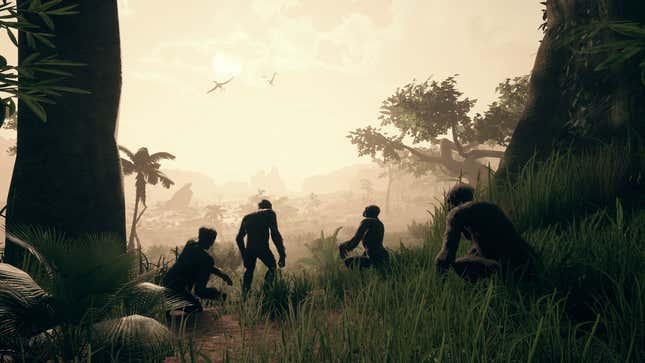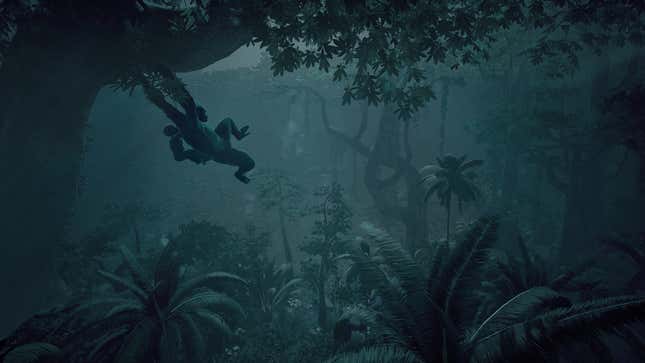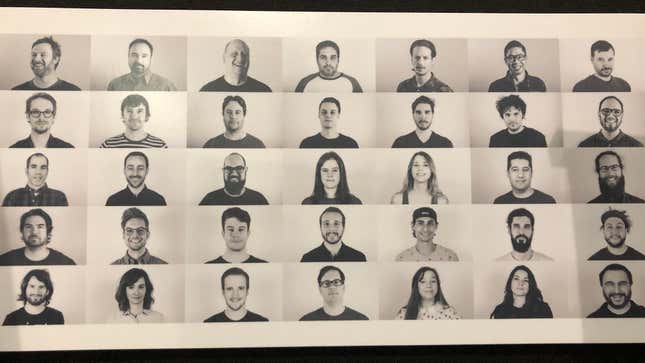
I was sitting in an interview room asking the ever-cheerful Patrice Désilets about the controls in his first new game since 2010’s Assassin’s Creed Brotherhood and he lit up.
He imagined an Xbox controller and rattled through the button assignments.
“‘A’ is all about the reflexes,” he said. “‘B’ is about the communication, ‘X’ is about the senses—the smell and the hearing—and ‘Y’ is about analyzing with your intelligence. The bumpers are your two hands and eventually the trigger is about your emotions.”
This is pure Patrice Désilets, best known as the director of the first three Assassin’s Creed games, and it’s much of the reason why anyone might be excited about the fact that he’s finally, nearly ready to release a new game again. The new one from his studio of three dozen developers is called Ancestors: The Humankind Odyssey and is slated for a PC release on the Epic Games Store on August 27, and then for Xbox One and PS4 in December. It’s strange, which is the norm for Désilets. And he’s not positive you’ll like it, which is the norm for him, too. He doesn’t make the stuff you’d expect.
“I would not be able to do a normal game,” he said. “If people are like, ‘I like your game. I understand it.’ That I would be stressed about.”
He’d be stressed if people heard about Ancestors and immediately said they liked his game and understood it?
“Yeah,” Désilets said. “That would mean I didn’t do my job.”

Ancestors is a third-person action-adventure game that spans eight million years, starting its players off in 10,000,000 BC. You control generations of prehistoric primates, starting as a baby, trying to reach the age of 15, spawning and skipping ahead to control the next generation. They’ll learn to survive, learn to hunt and will slowly evolve. Some babies will turn out to have unique traits, Désilets said. “Maybe the ability to digest meat. And if that baby survives long enough to mate and pass it to another generation, then suddenly your species is capable of eating meat. If the player’s character dies, they take control of another member of their primate clan, hoping to bring the evolutionary advances to their offspring.
He says there’s no shortage of material for the game and offers Kotaku an exclusive: “You won’t be able to make fire” because that comes after the eight million years the game is covering. That could go in a sequel, perhaps.
He keeps himself from explaining much more about this one. “I don’t want to say a lot,” he said. “Because the real pleasure is set in the discovery of it all.”
The idea of Ancestors is that you’re following the path of evolution, learning new skills and experiencing the gradual transformation from ape to human with bonus points if you make any advances faster than they supposedly happened in reality.
“I’m asking the question to every player: ‘Hey homo sapiens, do you think you’re intelligent enough to survive like our ancestors did?’”
Désilets used that line on me when we chatted at this year’s E3 in Los Angeles last month and also during a showcase with my friend Geoff Keighley, for whom Désilets brought several minutes of a pre-recorded playthrough of the game. In it, you can see the continuity of game design interests from the same person who was the visionary behind Prince of Persia Sands of Time and Assassin’s Creed, as the player-character does a lot of climbing in a beautiful and old place (in this case the trees of a prehistoric African jungle) with nary a standard video game hero nor gunshot to be seen.
The game is unusual. It has characters who don’t speak, though they can communicate in some ways. Désilets says there are a variation of the kind of squad commands you might find in a covert ops game. The characters wear no clothes (there’s a “lot of fur” which helps them achieve an acceptable game rating). There’s no single lead character, no individual hero’s tale.
Even the aforementioned controls sound distinct, not just because he’s doing another experimental button scheme, but because he’s decided to trigger actions at the moment a button is released rather than when it is pressed. “That’s how we do it in real life,” he said. We think, then we act. Well, sometimes.
Désilets did not bring a playable build of the game with him to E3, saying it would have been too taxing for his small team to create a demo for the show as they race to finish the game for a late August PC release (it’s not slated for consoles until December). This was both understandable and worrisome, for anyone, myself included, eager to know if Désilets still has it.
Back in 2003, Sand of Time was a revelation, mixing exhilarating running and jumping with a game-long dialogue-driven love story and spicing it up with the ability to rewind failed jumps and try them again.
When Désilets was tasked with cooking up a Sand of Time sequel for the dawn of the Xbox 360 and PlayStation 3 generation, he concocted Assassin’s Creed, a game about a man in modern times using a device to relive the lives of his assassin ancestors, first as a 12th century Syrian during the Crusades and then as an Italian during the Renaissance. The controls for those early Assassin’s Creed games were based on the idea of puppetry: top button for the head, middle buttons for the arms, lowest button for the legs.
He says he got tired of making Assassin’s Creed games and left publisher Ubisoft after the third one, Brotherhood. That concluded a decade of productivity and hits, followed by a decade of no released games. He tried making a new one at THQ before the studio collapsed and Ubisoft brought him back, only for him to leave again. At E3 in 2015 he started talking to me about his small new studio, Panache, and his idea for Ancestors: “Assassin’s Creed meets the Civilization tech tree.” The game would be episodic (it no longer is) and surely out sooner than 2019.

Tossed a softball about whether the game is really going to be fun enough, he snarks: “No it’s really boring.”
He swears he’s never made a game he’s had this much fun playing and promises that, no, he’s not just saying that because he is currently making this one: “It’s the game I play the most in all my career. You like the Prince, you like Assassin’s. Me, I was fucking bored at the end of playing that game.” He tells the story of playing it recently, of being an elder protecting two babies during a rainstorm, trying to keep them alive to make humanity possible. He gets dreamy about it, wistful that he’s not playing as we speak. “I need my fix. It’s been a week now. I need to go back home and eventually get myself lost in the savannah with my crew and go kill a fucking leopard.”